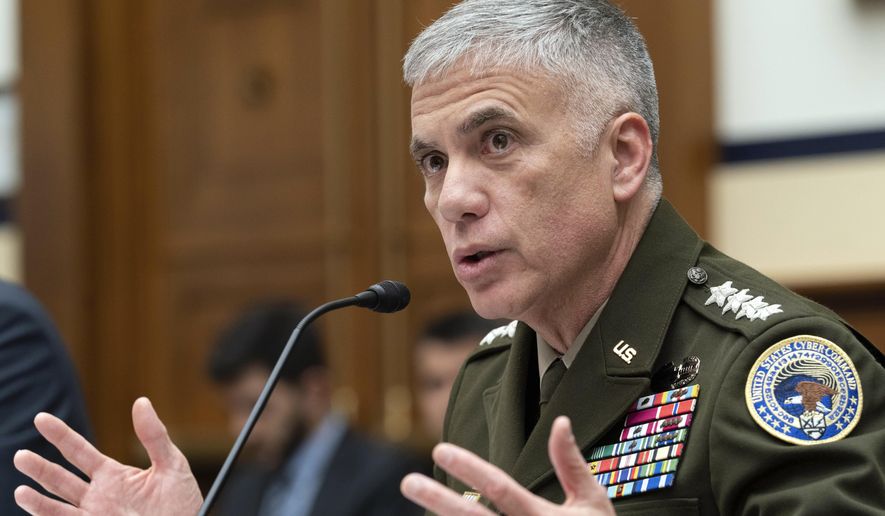A version of this story appeared in the Threat Status newsletter from The Washington Times. Click here to receive Threat Status delivered directly to your inbox each Wednesday.
China, Russia and Iran all sought to meddle in the 2022 U.S. elections, using covert manipulation operations and hidden online influence efforts to misinform and try to sway voters, according to a newly declassified intelligence community report.
The Office of the Director of National Intelligence published the intelligence community’s assessment that China targeted Congress, Iran boosted leftist causes and candidates, and Russia sought to agitate conservatives ahead of the November 2022 elections. The moves marked an intensification of election meddling by America’s global adversaries.
Chinese government leaders repeatedly instructed officials to focus on Congress. State-linked hackers scanned more than 100 state and national party web domains, according to the partially redacted report released on Monday. U.S. analysts said they did not see signs that Beijing’s efforts tried to hack the election infrastructure itself.
“We assess that [Chinese] intelligence services, diplomats and online influence actors conducted activities to undermine or promote specific candidates from both major U.S. political parties,” the report said. The effort included “covertly denigrating a named U.S. senator online using inauthentic accounts,” according to the report.
China did not back one political party over another because it determined that Congress would remain adversarial to Beijing regardless of who was in power, according to the joint Intelligence Community Assessment.
Iran’s theocratic regime backed liberal candidates for elected office. Iranian hackers used fake personas masquerading as left-leaning Americans and “generally supported left-leaning U.S. politicians, including a range of House and Senate candidates.”
To bolster their liberal bona fides, the clandestine Iranian networks voiced strong pro-Palestinian sentiments, according to the report.
“In mid-2022, Iranian [REDACTED] considered distributing propaganda, developing and employing ‘troll teams’ on social media platforms, and establishing front news agencies to interact with undisclosed media outlets in the United States,” the report said.
Tehran’s intrusions extended into the physical world as government officials attempted to obtain sensitive information surrounding the midterm elections.
“We detected some activity by Iranian [REDACTED] government officials to try to shape U.S. policy toward Iran and collect sensitive information, some of which was election-related,” the report said.
While Iran pumped up liberals, the Russian government and its allies denigrated Democrats in an apparent effort to stoke internal conflict in American domestic politics. The report said the Kremlin did not aim to shape outcomes in specific elections despite amassing “some potentially compromising material.”
The operation was not scattershot. Russian influence efforts fine-tuned some of their messages, the U.S. assessment concluded, to provoke responses from “U.S. males who were more than 40 years old and interested in ‘right-wing conservatism,’” with one clear intention to undermine U.S. popular support for Ukraine.
“A Russian government-linked [REDACTED] developed plans to encourage U.S. divisions and erode U.S. public support for aid to Ukraine by targeting white, Latino, lower- and middle-class Americans, supporters of so-called ‘traditional family values,’ and citizens who purportedly felt disadvantaged by the administration’s policies and restricted by social media censorship, [REDACTED],” the report said.
Russian actors also sought to influence left-leaning audiences with messages arguing that supporting Ukraine risked a direct U.S. war with Russia.
China, Iran and Russia were not the only foreign players looking to interfere in U.S. politics last year, U.S. intelligence analysts said. Cuba worked to advance its agenda with various operations and “sought to identify and establish relationships with members of the U.S. media who held critical views of members of Congress.”
Although the intelligence community said it witnessed a slew of foreign information manipulation tactics, it emphasized that it did not see efforts to breach American election infrastructure. The assessment said the U.S. intelligence community has not observed persistent hacking efforts directed by foreign governments against election infrastructure since the 2016 presidential election cycle.
American cybersecurity officials are preparing for foreign threats to next year’s elections. The National Security Agency and U.S. Cyber Command have mobilized their Election Security Group and are evaluating whether China will change its game plan for the 2024 elections, said Army Gen. Paul Nakasone, director of the U.S. Cyber Command.
• Ryan Lovelace can be reached at rlovelace@washingtontimes.com.




Please read our comment policy before commenting.